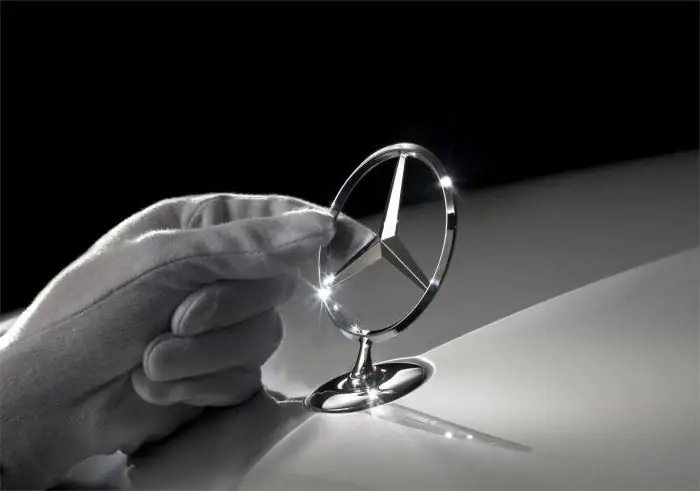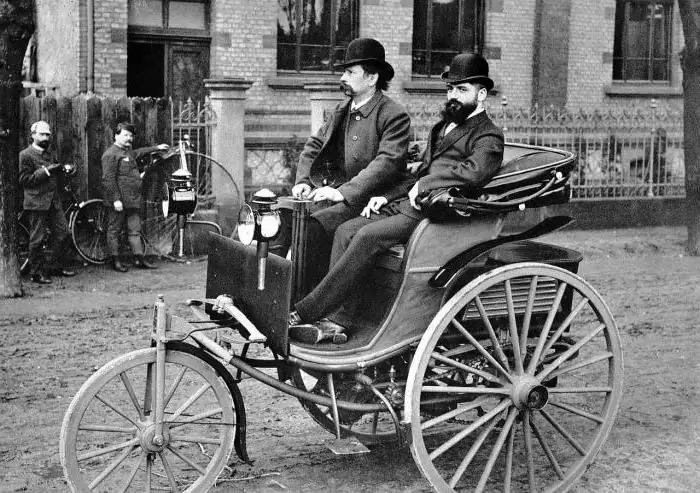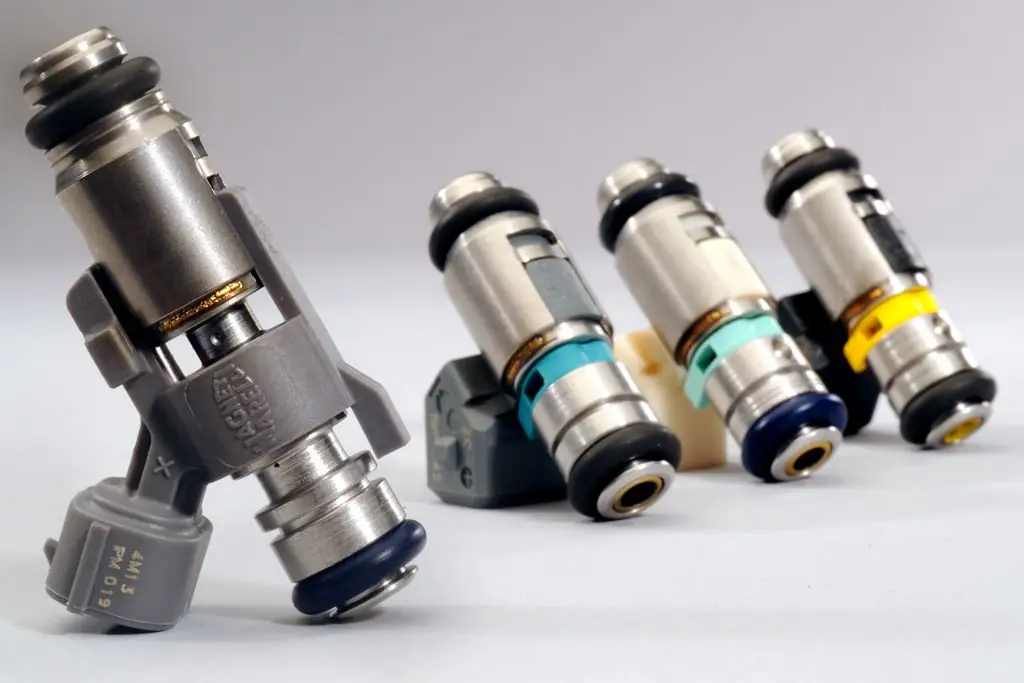2026 Author: Erin Ralphs | ralphs@carsalmanac.com. Last modified: 2025-01-22 21:14:09
At the end of the XΙX century, talented engineers from Germany, Karl Benz and Gottlieb Daimler, not knowing at first about the existence of each other, laid the foundation for the future automotive industry in their workshops. Benz was the first to launch a prototype of the future car, and Daimler was the first to offer a functional engine to the nascent automotive industry.
Geniuses are not born
Hereditary baker and wine grower Johannes Daimler from Schorndorf, Germany, saw in his son Gottlieb, born March 17, 1834, the future successor of the family business or a municipal employee. But fate decreed otherwise. From school years, the boy was fascinated by technology and the exact sciences. Yielding to the desires of his son, at the end of elementary school, his father gave him as an apprentice to the gunsmith Reitel. By the age of seventeen, Gottlieb Daimler had mastered the speci alty of a gunsmith. In 1853, on the recommendation of fellow countryman and public figure F. Steinbeis, a young man was hired to work in the workshops of a railway repair plant in Strasbourg (France), where he acquired the necessary production experience to continue his education. In 1957, Gottlieb Daimler entered the Stuttgart Polytechnic Institute. Two years later, he received an engineering degree, but, according to him, he continued to study all his life.

To the heights of engineering
The young specialist continued his career at the same Strasbourg enterprise. Gottlieb Daimler became more and more convinced every day that an alternative to bulky and metal-intensive steam engines should be a lighter and more convenient engine to operate. In search of like-minded people, the German engineer changed several enterprises in France and England. In 1863, enriched with advanced European experience, Daimler returned to his homeland. At the agricultural machinery factory in Reutlingen, he started as a draftsman, and a year later he became technical director. But the main fateful milestone of this period was the acquaintance with the talented mechanic Wilhelm Maybach, who became a true friend and ally for life.

Working at Deutze
In 1872, the inventor of the internal combustion engine, Nikolaus Otto, and his financial partner, Eugen Leigen, were looking for a competent and enterprising engineer for their "Gas Engine Factory in Deutz", capable of mass-producing industrial engines. Their choice fell on Daimler and, as time has shown, was absolutely correct. The new technical manager brought with him a group of highly skilled workers and Maybach, who headed the design office. Despite the commercial success of the enterprise, the associates were finally convinced that the stationary gas engine was nothas a future: with three-meter dimensions, the theoretical maximum power was limited to 3-4 liters. s.

On the way to a dream
The inventions of Gottlieb Daimler and Wilhelm Maybach did not resonate with the leaders of Deutz, and in 1872, like-minded people organized their own project, in which the former was the leader, and Maybach was the design engineer.
On the territory of the estate bought in the vicinity of Stuttgart, the partners set up workshops, where they came to grips with the creation of a new engine. The first prototype, running on gasoline, was a high-speed (up to 900 rpm, which is not bad for that time) single-cylinder engine with glow ignition and a simple evaporative carburetor. Further work of the inventors was to minimize the unit. A water cooling system was developed and a sealed crankcase was created. In 1885, Gottlieb Daimler received a patent for the use of a modernized internal combustion engine in transport.

First locomotive, motorcycle and car
In the same year, new engines were installed in a locomotive serving the factory sidings at the Otto-Deutz plant and in a passenger car on the Kirchheim Railway. Next, the inventors presented a prototype of a modern motorcycle - a motorized wooden bicycle that reaches speeds of up to 12 km/h.
The following year, an improved engine was installed onGottlieb Daimler's first car. The "motor carriage", patented in 1986, was made in Hamburg and assembled in the Stuttgart workshops. The engine and steering, under the direction of Maybach, were assembled at the Esslingen plant. The transmission was a belt drive. The achieved speed of 16 km/h was considered a good result for the first sample.

Looking for commercial partners
By 1888, modifications of motors for boats and airships were created. The initiatives and areas of application of the new internal combustion engines demonstrated by the partners did not arouse interest among entrepreneurs for some time. The situation was saved by the sale of boat engines, which were willingly bought by the owners of small vessels.
The first commercial offer came from France. Daimler's products began to be installed on their cars by the Peugeot and Panar and Levassor companies, but there was always not enough money to produce new engines. This forced Gottlieb Daimler to attract local businessmen as investors and organize the Daimler Motors (Daimler Motoren Gesellschaft) joint-stock company in 1890. The policy pursued by the actual owners of the company, which boils down to the creation of stationary mechanisms, did not coincide with the views of Daimler and Maybach, but friends were hard at work developing new engines for road transport.
A star will rise…
The world-famous three-beam star, symbolizing the use of their motors on land, in water and inheaven, Daimler painted on the walls of his own house back in 1880. The drawing turned out to be prophetic. The victory of cars equipped with DMG engines in numerous races and races has led to a gradual increase in sales of products. The spray-type carburetor invented by Maybach in 1893 and the spark ignition system developed by Robert Bosch significantly improved the traction and speed characteristics and controllability of the internal combustion engine.
The car has gone from an outlandish commodity to a necessary means of transportation. The Phoenix power unit designed by Maybach served as the basis for the production of a whole range of engines with a power of up to 9 hp. With. In 1899, cars were already equipped with a four-cylinder 24-horsepower engine.

Best or Nothing
Gottlieb Daimler, the founder and head of DMG, died at the age of 66, in 1900. He did not live about a year before the appearance of the legendary Mercedes brand in the model range of his company, which marked the beginning of the history of the most popular and respected in worldwide automotive brand. Since 1926, after merging with Karl Benz's Benz & Cie into one concern, cars have been produced under the Mercedes-Benz brand.
One can argue endlessly about who Gottlieb Daimler was, what he invented. Who did more for the formation and development of Daimler Benz AG and the global automotive industry as a whole. Time and the well-deserved success of Mercedes cars equalized the organization althe ability and determination of Gottlieb Daimler, the indefatigability and versatility of Karl Benz, the technical genius of Wilhelm Maybach.
Recommended:
Body type - to each according to his needs

During the history of the automotive industry, many different types of cars, their shapes and designs have been invented. The race of styles continues today
Badges of car brands and names. German, American and Chinese car brands and their badges

Badges of brands of cars - how diverse they are! With and without a name, intricate and simple, multi-color and plain … And all are very original and interesting. So, since German, American and Asian cars are the most common and in demand, then using the example of their best cars, the topic of the origin of emblems and names will be revealed
Opel Insignia - reviews on his side

Opel Insignia is a brand new car that doesn't look like a Vectra. The new model attracts with its swift dynamic appearance. Five years of hard work of the company's designers have only benefited! There is absolutely nothing left of the former pragmatism
"Benz-Daimler" (Daimler-Benz) - German automotive concern

The German concern "Benz-Daimler", whose main activity is the production of cars, has a long history. It arose from the merger of two companies. One of them was the company "Benz", and the second - "Daimler-Motoren Gezzellschaft"
Carburetor and injector: difference, similarities, advantages and disadvantages of carburetor and injection engines, principle of operation and expert reviews

For more than a hundred years, the car has firmly established itself in our lives. During this time, managed to become a familiar, everyday means of transportation. Let's see what the difference is between a carburetor and an injector, what advantages and disadvantages they have

